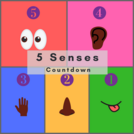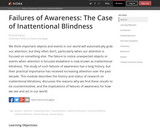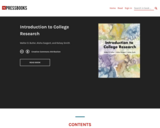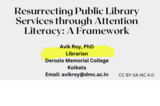
Strategy for reducing anxiety that may cause inattention and zoning out in triggering situations.
- Subject:
- Early Childhood Development
- Psychology
- Special Education
- Material Type:
- Activity/Lab
- Author:
- Fareeda Taha
- Date Added:
- 05/08/2022

Strategy for reducing anxiety that may cause inattention and zoning out in triggering situations.

This course is the second half of the intensive survey of brain and behavioral studies for first-year graduate students in the Brain and Cognitive Sciences curriculum. Each module of this core course involves a series of overview lectures by leading researchers in the field. By offering a thorough introduction to the current state of the discipline while emphasizing critical thinking, the course aims to prepare students as cognitive scientists.
Topics include: perception, attention, working memory, recognition and recall, language, and other issues in cognitive science. Topics are covered from the neural, behavioral and computational perspectives.

This class is the second half of an intensive survey of cognitive science for first-year graduate students. Topics include visual perception, language, memory, cognitive architecture, learning, reasoning, decision-making, and cognitive development. Topics covered are from behavioral, computational, and neural perspectives.

This undergraduate course is designed to introduce students to cognitive processes. The broad range of topics covers each of the areas in the field of cognition, and presents the current thinking in this discipline. As an introduction to human information processing and learning, the topics include the nature of mental representation and processing, the architecture of memory, pattern recognition, attention, imagery and mental codes, concepts and prototypes, reasoning and problem solving.

We think important objects and events in our world will automatically grab our attention, but they often don’t, particularly when our attention is focused on something else. The failure to notice unexpected objects or events when attention is focused elsewhere is now known as inattentional blindness. The study of such failures of awareness has a long history, but their practical importance has received increasing attention over the past decade. This module describes the history and status of research on inattentional blindness, discusses the reasons why we find these results to be counterintuitive, and the implications of failures of awareness for how we see and act in our world.

This practice guide will help you to refine methods for gaining all students’ attention to create a learning environment that supports student engagement and minimises disruptive behaviours.
Efficiently gaining all students’ attention supports student safety, maximises instructional time and reduces the likelihood of students missing critical information. Teachers use scanning, non-verbal gestures, and audible or visual prompts to gain student attention, to ensure students are focused and ready to receive instructions.

Student Primers, Instructional Strategies, Study Strategies and Recommended Apps, Games, Activities, etc. geared towards helping students develop skills for Focus and Attention. Optional links to thousands of teacher-reviewed resources.

This course surveys the core perceptual and cognitive abilities of the human mind and asks how they are implemented in the brain. Key themes include the representations, development, and degree of functional specificity of these components of mind and brain. The course will take students straight to the cutting edge of the field, empowering them to understand and critically evaluate empirical articles in the current literature.

Human Supervisory Control of Automated Systems discusses elements of the interactions between humans and machines. These elements include: assignment of roles and authority; tradeoffs between human control and human monitoring; and human intervention in automatic processes. Further topics comprise: performance, optimization and social implications of the system; enhanced human interfaces; decision aiding; and automated alterting systems. Topics refer to applications in aerospace, industrial and transportation systems.

This book acknowledges our changing information landscape, covering key concepts in information literacy to support a research process with intention. We start by critically examining the online environment many of us already engage with every day, looking at algorithms, the attention economy, information disorder and cynicism, information hygiene, and fact-checking. We then move into an exploration of information source types, meaningful research topics, keyword choices, effective search strategies, library resources, Web search considerations, the ethical use of information, and citation.

This course is a survey of the scientific study of human nature, including how the mind works, and how the brain supports the mind. Topics include the mental and neural bases of perception, emotion, learning, memory, cognition, child development, personality, psychopathology, and social interaction. Students will consider how such knowledge relates to debates about nature and nurture, free will, consciousness, human differences, self, and society.
Course Format
This course has been designed for independent study. It includes all of the materials you will need to understand the concepts covered in this subject. The materials in this course include:
A full set of Lecture Videos by Prof. John Gabrieli.
Reading Assignments in several books, including one free online textbook and detailed notes on another book.
Assorted multiple choice and short answer questions to Check Yourself on the material in each session.
Supporting Discussion content that elaborates on the lectures and reading.
A rich collection of online resources for Further Study on each session's topics.
A full set of Exams with solution keys, and extra practice questions for review.

This course explores the social relevance of neuroscience, considering how emerging areas of brain research at once reflect and reshape social attitudes and agendas. Topics include brain imaging and popular media; neuroscience of empathy, trust, and moral reasoning; new fields of neuroeconomics and neuromarketing; ethical implications of neurotechnologies such as cognitive enhancement pharmaceuticals; neuroscience in the courtroom; and neuroscientific recasting of social problems such as addiction and violence. Guest lectures by neuroscientists, class discussion, and weekly readings in neuroscience, popular media, and science studies.

Psychology is designed to meet scope and sequence requirements for the single-semester introduction to psychology course. The book offers a comprehensive treatment of core concepts, grounded in both classic studies and current and emerging research. The text also includes coverage of the DSM-5 in examinations of psychological disorders. Psychology incorporates discussions that reflect the diversity within the discipline, as well as the diversity of cultures and communities across the globe.Senior Contributing AuthorsRose M. Spielman, Formerly of Quinnipiac UniversityContributing AuthorsKathryn Dumper, Bainbridge State CollegeWilliam Jenkins, Mercer UniversityArlene Lacombe, Saint Joseph's UniversityMarilyn Lovett, Livingstone CollegeMarion Perlmutter, University of Michigan


By the end of this section, you will be able to:Distinguish between sensation and perceptionDescribe the concepts of absolute threshold and difference thresholdDiscuss the roles attention, motivation, and sensory adaptation play in perception

Attention literacy

This course examines interpersonal and group dynamics, considers how the thoughts, feelings, and actions of individuals are influenced by (and influence) the beliefs, values, and practices of large and small groups. Learning occurs through a combination of lectures, demonstrations and in-class activities complemented by participation in small study groups and completion of homework assignments.